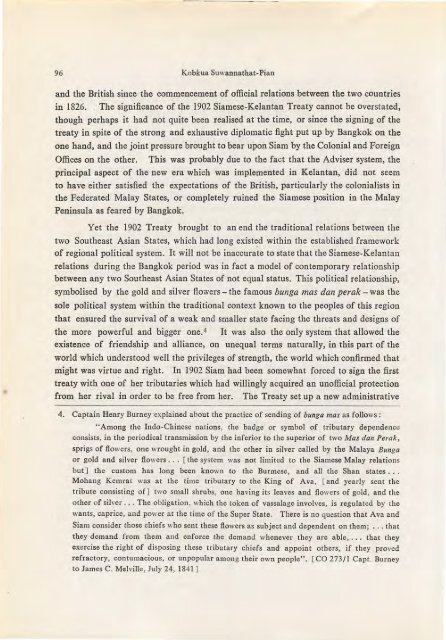The Journal of the Siam Society Vol. LXXII, Part 1-2, 1984 - Khamkoo
The Journal of the Siam Society Vol. LXXII, Part 1-2, 1984 - Khamkoo
The Journal of the Siam Society Vol. LXXII, Part 1-2, 1984 - Khamkoo
You also want an ePaper? Increase the reach of your titles
YUMPU automatically turns print PDFs into web optimized ePapers that Google loves.
96 k obkua Suwaooathat-Pian<br />
and <strong>the</strong> British since <strong>the</strong> commencement <strong>of</strong> <strong>of</strong>ficial relations between <strong>the</strong> two countries<br />
in 1826. . <strong>The</strong> significance <strong>of</strong> <strong>the</strong> 1902 <strong>Siam</strong>ese-Kelantan Treaty cannot be overstated,<br />
though perhaps it had not quite been realised at <strong>the</strong> time, or since <strong>the</strong> signing <strong>of</strong> <strong>the</strong><br />
treaty in spite <strong>of</strong> <strong>the</strong> strong and exhaustive diplomatic fight put up by Bangkok on <strong>the</strong><br />
one hand, and <strong>the</strong> joint pressure brought to bear upon <strong>Siam</strong> by <strong>the</strong> Colonial and Foreign<br />
Offices on <strong>the</strong> o<strong>the</strong>r. This was probably due to <strong>the</strong> fact that <strong>the</strong> Adviser system, <strong>the</strong><br />
principal aspect <strong>of</strong> <strong>the</strong> new era which was implemented in Kelantan, did not seem<br />
to have ei<strong>the</strong>r satisfied <strong>the</strong> expectations <strong>of</strong> <strong>the</strong> British, particularly <strong>the</strong> colonialists in<br />
<strong>the</strong> Federated Malay States, or completely ruined <strong>the</strong> <strong>Siam</strong>ese position in <strong>the</strong> Malay<br />
Peninsula as feared by Bangkok.<br />
Yet <strong>the</strong> 1902 Treaty brought to an end <strong>the</strong> traditional relations between <strong>the</strong><br />
two Sou<strong>the</strong>ast Asian States, which had long exist~d within <strong>the</strong> established framework<br />
<strong>of</strong> regional political system. It will not be inaccurate to state that <strong>the</strong> <strong>Siam</strong>ese-Kelantan<br />
relations during <strong>the</strong> Bangkok period was in fact a model <strong>of</strong> contemporary relationship<br />
between any two Sou<strong>the</strong>ast Asian States <strong>of</strong> not equal status. This political relationship,<br />
symbolised by <strong>the</strong> gold and silver flowers- <strong>the</strong> famous bunga mas dan perak- was <strong>the</strong><br />
sole political system within <strong>the</strong> traditional context known to <strong>the</strong> peoples <strong>of</strong> this region<br />
that ensured <strong>the</strong> survival <strong>of</strong> a weak and smaller state facing <strong>the</strong> threats and designs <strong>of</strong><br />
<strong>the</strong> more powerful and bigger one. 4 It was also <strong>the</strong> only system that allowed <strong>the</strong><br />
existence <strong>of</strong> friendship and alliance, on unequal terms naturally, in this part <strong>of</strong> <strong>the</strong><br />
world which understood well <strong>the</strong> privileges <strong>of</strong> strength, <strong>the</strong> world which confirmed that<br />
might was virtue and right. In 1902 <strong>Siam</strong> had been somewhat forced to sign <strong>the</strong> first<br />
treaty with one <strong>of</strong> her tributaries which had willingly acquired an un<strong>of</strong>ficial protection<br />
from her rival in order to be free from her. <strong>The</strong> Treaty set up a new administrative<br />
4. Captain Henry Burney ·explained about <strong>the</strong> practice <strong>of</strong> sending <strong>of</strong> bung a mas as follows:<br />
" Among <strong>the</strong> Indo-Chinese nations, <strong>the</strong> badge or symbol <strong>of</strong> tributary dependence<br />
consists, in <strong>the</strong> periodical transmission by <strong>the</strong> inferior to <strong>the</strong> superior <strong>of</strong> two Mas dan Perak,<br />
sprigs <strong>of</strong> flowers, one wrought in gold, and <strong>the</strong> o<strong>the</strong>r in silver called by <strong>the</strong> Malaya Bunga<br />
or gold and silver flo wers . .. [<strong>the</strong> system was not limited to <strong>the</strong> <strong>Siam</strong>ese Malay relations<br />
but] <strong>the</strong> custom has long been known to <strong>the</strong> Burmese, and all <strong>the</strong> Shan states . ..<br />
Mohang Kemrat was at <strong>the</strong> time tributary to <strong>the</strong> King <strong>of</strong> Ava, [and yearly sent <strong>the</strong><br />
tribute consisting <strong>of</strong>] two small shrubs, one having its leaves and flo wers <strong>of</strong> gold , and <strong>the</strong><br />
o<strong>the</strong>r <strong>of</strong> silver . . . <strong>The</strong> obligation, which <strong>the</strong> token <strong>of</strong> vassalage involves, is regulated by <strong>the</strong><br />
wants, caprice, and power at <strong>the</strong> time <strong>of</strong> <strong>the</strong> Super State. <strong>The</strong>re is no question that Ava and<br />
<strong>Siam</strong> consider those chiefs who sent <strong>the</strong>se flo wers as subject and dependent on <strong>the</strong>m; . .. that<br />
<strong>the</strong>y demand from <strong>the</strong>m and enforce <strong>the</strong> demand whenever <strong>the</strong>y are able, . . . that <strong>the</strong>y<br />
exercise <strong>the</strong> right <strong>of</strong> disposing <strong>the</strong>se tributary chiefs and appoint o<strong>the</strong>rs, if <strong>the</strong>y proved<br />
refractory, contumacious, or unpopular among <strong>the</strong>ir own people" . [CO 273/1 Cap t. Burney<br />
to James C . Melville, July 24, 1841 ]

















